Poets, Turn on Your Close Captions!

As a writer-type who’s always looking for entertaining new slippages between text and meaning in my work—whether through the use of collage, homophonic translation, warped subtitles, or Flarf-y hijinks—I’ve always been a fan of the literary potential of Closed Captioning. Yes, that dusty button on your TV’s remote. What does it do? Well, it welds the human to the mechanical, for one. I try to always keep those captions turned on, especially during live news broadcasts, sporting events, and public speeches, and wait for the accidents to happen. These accidents are frequently glorious.
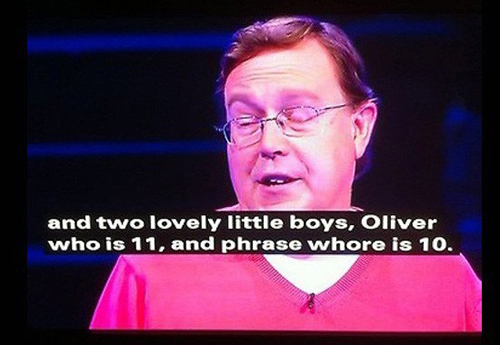
I know, I know, it’s a little mean of me to say so. Close captioning was developed for the noblest of reasons: to help hearing-impaired viewers follow broadcast television, in real-time, without the need for an expensive set-top decoder. The fact that millions of immigrants to the United States were able to improve their English, or learn it outright, via their TV’s close captions is another incredible social side-effect of the technology.

But I’m talking about closed captioning for poets. As a generative tool. But first, let’s take a second to talk about the mechanics at work here. Today’s closed captioning systems are more computerized, more streamlined, but they emerged from a much less digital time, and still retain many of the analogue trappings that create the slippages of language I’m so into. There’s something about an army of highly trained, real-time court stenographers watching Monday Night Football, live Presidential Debates, CNN broadcasts, etc., transcribing what they hear in shorthand, and having that script pass instantaneously through a computer decoder, which then spits out the completed text, splicing it right onto the live program at a (usually) 3-4 second delay, and feeding it right into your television, which translates the signal back out into, mostly, English.


Let’s just say there are all sorts of ways for these processes to go way wrong, particularly on live broadcasts (pre-recorded programs tends to be a lot slicker and better-edited but, as you can see in the opening sequence from Law & Order pictured above, um, never foolproof). The stenographers, as capable as they are, are cranking away at 100 mph. One slip of the finger and God becomes Godzilla, Obama goes Osama, and football turns into roadkill.
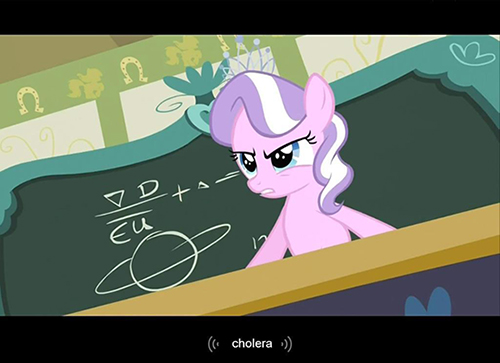
On top of that, the stenotype machines that translate the shorthand back out into complete sentences use some pretty archaic shortcuts of their own. Sound effects get written out in longhand. Strangely apt snap-judgements are made. The shifting decoding standards of different generations of televisions sometimes throw their own quirks into the mix. Added to that, in the pre-digital TV era, the close caption signal traveled into the television entirely through the coaxial antenna cable, and loose connections often meant even looser language, for whatever reason. All of these factors add up to a working protocol with a huge potential for errors. Something truly half-human, half-machine. Yum.
And I’m not even talking about the idiotic code robots—sorry, I meant to say “speech recognition technology”—that YouTube and other video sites have started to use. That’s an entirely different linguistic train-wreck, one I hope someone else writes about soon.
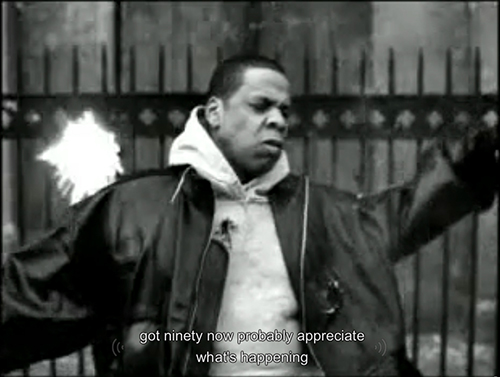
Of course, a lot of these slips are little more than jokey, goofy memes. I mean, look at what I’ve been illustrating this article with. But I encourage you all to turn those captions on and start watching the fur subtly fly as you feed off the more-than-occasional disconnects. It’s one of my favorite writing activities!

But there are times when these slippages become poignant or, as I’m about to describe, even career-defining.
This starts off as a sports thing. For more than two decades I have fought the most futile battle possible and, whether living in Chicago, New York, San Francisco, or wherever, I have been a loyal fan of one of the NBA’s most despondent, windblown franchises, the Sacramento Kings. I also loyally follow my hometown Golden State Warriors and Oakland A’s, traditionally greater, more striving teams, but that’s another story. I spend $250 a year to follow the Kings on NBA League Pass, and I can safely say that this season, for example, I easily watched 80 of their 82 games. A lot of the time I was wishing my eyes were stitched shut (they went 28-54 this year, just like last year). I mean suckdom. You’re all poets, and you know’ve got some similarly worthless obsessions, so go easy on me here.
The Kings have got where they are through cycles of bad ownership, the difficulty of luring top talent to the small Sacramento market (it’s a neat town, trust me, but it’s no South Beach), and, perhaps most of all, the team’s historically bad judgement in the annual NBA Draft. This year they did it again, drafting Michigan’s sharp-shooting Nick Stauskas, a not very strong, not very fast, but very white shooting guard from Greater Toronto who played two college seasons for the Wolverines. Let’s just say he’s not yet entirely up to the pace and power of the professional game. I’m rooting for the kid though.
Anyway, on March 24th, the Kings were in the midst of a meaningless home game against the even more lethargic Philadelphia 76ers. The second quarter had just started when, wow, Stauskas hit a pretty clean three-point shot, and while the live play-by-play announcer blandly called it as “Stauskas, hitting the three,” a very perceptive 76ers fan, watching the close-caption telecast, spotted something completely different.
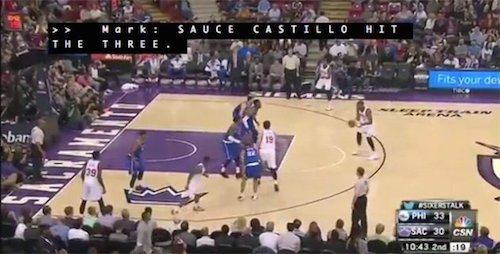
Let’s just say that Sauce Castillo would be the last nickname you would associate with this humble rookie jock from suburban Mississauga, Ontario. But, I don’t know, something about the way it rolls off the tongue, the fact that "sauce" has become universal basketball slang for your game being ON, and that Castillo is Spanish for “castle”…created the perfect nickname whirlwind for this rookie guard who up to this point, shall we say, lacked a defined identity. All of a sudden we had ourselves a tongue-in-cheek Latino icon on our hands, from the unlikeliest of places. Almost overnight, our Sauce Castillo started trending something massive. For a team that gets almost no national love—for good reason—the Kings took this baffling celebrity and ran with it at full gallop. Do you doubt me?
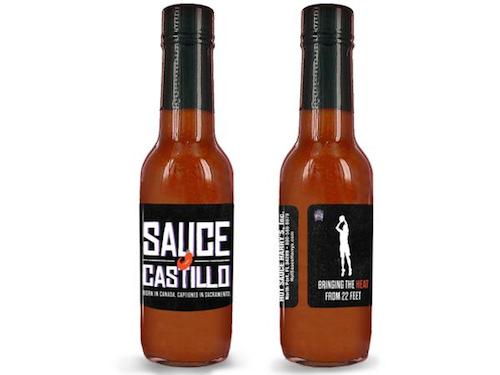
They’ve branded a new hot sauce, held Sauce Castillo nights for their last few home games, and whenever he hits a shot at Sacramento’s Sleep Time Arena, mariachis wail over the PA system.
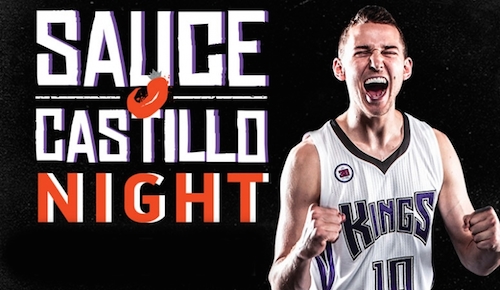
Sure, it may be little more than a late season push by a moribund NBA franchise’s PR office: most of America could give two shits either way, and perhaps the phenomenon will be mostly forgotten by next season, when, I hope, Sauce comes back as a much fitter and stronger basketball player. Maybe this whole affair is, yet again, Just Another Meme. I mean, even TMZ got in on it, good Christ. But I can’t help wondering if, deep down, closed-captioning just handed a mildly talented young man a brand new life. I’m off to Sacramento to visit family for a few days later this week, and I know I’m going to pick myself up some sauce. Sauce Castillo. Fuck it, you know? I’m buying in.
Until then, though, I’m going to be watching Fox News, with them Closed Captions turned on, eyes glued to the screen, pen at the ready. Go on, I’ll say. Translate something beautifully, stupidly. I’m waiting. You should be too.
Brandon Downing is a poet, visual artist, and filmmaker. His books of poetry include The Shirt Weapon...
Read Full Biography

